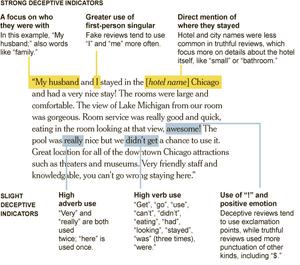For $10, we were willing to do a glowing news item about the New York Times's front-page Saturday story about fake online reviews, including some book reviews on Amazon. But we really did like the story so we'll go ahead anyway:
Online reviews of products and services, which have become ever more important to online retailers, have spawned a rash of "review factories"--independent companies that hire people to write reviews of things they know little or nothing about and then sell them to online retailers.
The Times spoke with one reviewer who was hired by a review factory to write Amazon reviews for $10 each. Freelance writer Sandra Parker said, "We were not asked to provide a five-star review, but would be asked to turn down an assignment if we could not give one." The Times noted that Parker's "brief notices for a dozen memoirs are stuffed with superlatives like 'a must-read' and 'a lifetime's worth of wisdom.' " It was not clear how the review factory dealt with Amazon or publishers of books listed on it.
Commenting in general on the subject of biased reviews, Amazon's director of community Russell Dicker told the paper: "Any one review could be someone's best friend, and it's impossible to tell that in every case. We are continuing to invest in our ability to detect these problems."
 A Cornell study described fake reviews involving Chicago hotels as "a narrative talking about their experience at the hotel using a lot of superlatives, but they were not very good on description. Naturally: They had never been there. Instead, they talked about why they were in Chicago. They also used words like 'I' and 'me' more frequently, as if to underline their own credibility."
A Cornell study described fake reviews involving Chicago hotels as "a narrative talking about their experience at the hotel using a lot of superlatives, but they were not very good on description. Naturally: They had never been there. Instead, they talked about why they were in Chicago. They also used words like 'I' and 'me' more frequently, as if to underline their own credibility."
The Times quoted another Cornell report on a survey of some 166 of Amazon's top 1,000 reviewers that offers a detailed history of reviews at Amazon, the importance of those recommendations to persuade some customers to buy and how Amazon has changed reviewers' rankings in the last several years.
Without being paid or receiving any other kind of remuneration, we give this 90-page report five stars. It's gripping, ripped from today's headlines (actually it contributed to a Saturday headlines) and a must-read for Amazon watchers. And we love its title: How Aunt Ammy Gets Her Free Lunch.
Tidbits from the report about the 166 respondents:
70% are male. 11% are retirees. 92% have college degrees. 14% are writers, the single-largest category. Only three are librarians. 39% of the respondents "report that they are engaged in or have been engaged in producing the same sorts of material that they review."
Reviewers review all kinds of products, and only 56% of the respondents mainly review books. The report noted: "A respondent who described himself as a 'senior book reviewer' for a magazine carries out reviews of energy pills and post-its. A published poet reviews a volume of poetry followed by a review of a toilet brush. A reviewer who has published no less than 38 novels has, as her latest item reviewed, a pair of left-handed scissors."
While the top 10 reviewers posted 60,317 reviews among them as of May 2010 and the No. 1 reviewer, Harriet Klausner, had 21,870 reviews, only 12 out of 166 respondents write more than 20 reviews per month.
85% of the reviewers have been sent free books or other products to review by publishers, authors and the like. The books are primarily ARCs, "many of lower quality." The reviewers choose "overwhelmingly" to review those books. Few reviewers acknowledge in their reviews receiving such products, although participation in Amazon's Vine program, under which some reviewers receive a range of products, is noted in the reviews.
While most of the reviewers are driven by altruism, they are concerned about their rankings. "In order to maintain their ranking, a level of productivity is demanded that seems to go against the grain of serious book reviewing," the report found. "Reviewers, especially the more prolific ones, are starting to cut corners and find ways of upping their productivity."
In conclusion, the report said:
"Amazon is getting its free lunch but the reviewers are getting their lunch too; they are rewarded by recognition, status, self-fulfillment, satisfaction, and the small utilitarian benefits we have noted. Their relationship with Amazon the company is, however, ambiguous. They of course are well aware that in a sense they owe it all to Amazon, but their relationship to Amazon, who they affectionately refer to as 'Ammy,' is rather as if to a distant, powerful, and extremely wealthy, Great-aunt. They do small menial work for the family business and Aunt Ammy, who owns it, is careful to pat them on the back while she gets richer and richer; and there is nothing they like to do better than bitch about this and Ammy's latest whims!"

